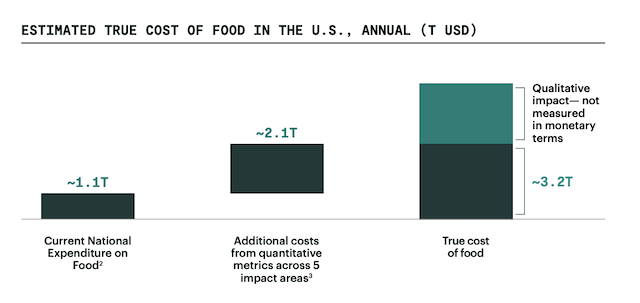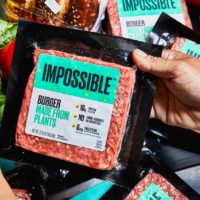 Source: Rockefeller Foundation
Source: Rockefeller Foundation
Every week we track the business, tech and investment trends in CPG, retail, restaurants, agriculture, cooking and health, so you don’t have to. Here are some of this week’s top headlines.
Spruce Point Capital has publicly denounced Oatly and Beyond Meat’s valuation, causing investors to wonder whether Oatly is on the precipice of a crash. In other news, some major investments closed this week, including Swiggy’s $1.25 billion raise, Nature’s Fynd’s $350 million and Pivot Bio’s $430 million.
Rockefeller Foundation released a new report that finds that the true cost of the U.S. food system is $3.2 trillion per year.
Our newsletter takes a lot of time and resources to produce. Make a one time or monthly contribution to help us keep it going. Whether it’s $5 or $500, every bit helps and shows us that you value our work.
Check out our weekly round-up of last week’s top food startup, tech and innovation news below or peruse the full newsletter here.
1. Why A Short-Seller Thinks $11B Oatly Is More Overvalued Than Beyond Meat – Forbes
Now that one short-seller, Spruce Point Capital, has gone public against Oatly, investors are left wondering if Oatly is on the precipice of a crash.
2. True Cost of Food: Measuring What Matters to Transform the US Food System – Rockefeller Foundation
The US food system rings up immense “hidden costs” from its impact on human health, the environment, and social and economic inequity to the tune of $3.2 trillion per year, finds a new report from Rockefeller Foundation.
3.Nature’s Fynd Closes $350M Investment Round – Food Dive
The funds will be directed to support new and small businesses in the processing sector. USDA also will reinvigorate the Packers and Stockyards Act and crack down on false country-of-origin labeling.
4. Pivot Bio Scores $430M in DCVC, Temasek-Led Series D Round – AFN
The startup’s technology ‘programs’ the DNA of microbes which naturally occur in the soil so that they produce more nitrogen. It mass-produces these microbes and sells them directly to farmers, who can apply them to their fields.
5. The Total Health and Climate Consequences of the American Food System Cost Three Times As Much As the Food Itself – Washington Post
A new report provides a roadmap to creating a post-pandemic food system with greater fairness, fewer adverse climate impacts and better health outcomes.
6. Indian Food Delivery Startup Swiggy Raises $1.25B Led by SoftBank and Prosus – TechCrunch
The startup said its recent bet to expand into grocery delivery, and pickup and drop-off service, has paid off. The value of orders it is processing now is 30% higher than those in the pre-Covid times.
7. Delivery Startup Jokr Gets $170M to Grow in Grocery Boom – Bloomberg
In the last four months, the company has built about 100 dark stores, and expects to double that number by the end of the year.
8. Germany: Choco Bites into $100M Series B, at a $600M Valuation, to Build a More Transparent, Sustainable Food Supply Chain – TechCrunch
The company’s core food procurement technology digitizes ordering workflow and communications for restaurants and suppliers.
9. Jeff Bezos Awards Jose Andres $100M for ‘Courage and Civility’ – Washington Post
Chef and humanitarian José Andrés plans to use the award to advance the work of his charity, World Central Kitchen.
10. This Startup Just Raised $75M to Make a More Cheesy Plant-Based Cheese – Fast Company
Nobell Foods has pioneered a new way to make dairy products from plants. The key lies in casein, a protein unique to milk, which the startup now grows in soybeans.
11. Beyond Meat Doubles Down on China with JD.com and Vegan Pork Launch – Green Queen
Beyond will begin selling its vegan meat to consumers in select cities including Shanghai, Beijing, Guangzhou and Shenzhen.
12. They Risked Their Lives During Covid. They Still Don’t Earn Minimum Wage. – New York Times
Surveys of food deliverers and others who work for app-based services illustrate the hazards they have faced during the pandemic.
13. We’re Not Animals, We’re Human Beings’: US Farm Workers Labor in Deadly Heat with Few Protections – The Guardian
Advocates want Osha to issue federal heat standards, requiring water, shade and rest breaks.
14. Cory Booker Just Picked a Fight with Giant Meatpackers – Mother Jones
The Booker bill would shake the foundations of the handful of companies that slaughter and pack the bulk of the meat. Biden now has a chance to prove he’s serious about confronting market power.
15. More Than a Third of Earth’s Population Faces Malnutrition Due to Covid – Bloomberg
The economic crisis and food system disruptions from the Covid-19 pandemic will worsen the lack of nutrition in women and children, with the potential to cost the world almost $30b in future productivity losses.
16. Jury Awards $125M After Walmart Fires Woman with Down Syndrome – New York Times
Walmart said the verdict would be reduced to $300k, which is the maximum amount allowed under federal law for compensatory and punitive damages.
Our newsletter is the absolute easiest way to stay on top of the emerging sector, so sign up for it today and never miss the latest food tech and innovation news and trends, Already signed up? Share the love with your friends and colleagues!





